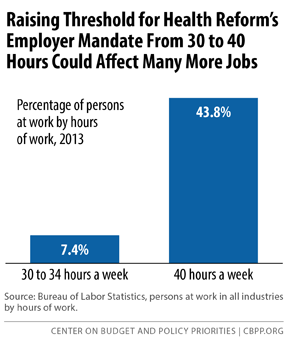
Head Smacker: House Jeopardizes Health Insurance for Workers While Claiming to Help Them
Check out this post by the Coalition on Human Needs' Senior Policy Writer Lecia Imbery:
The House used the first week of the new Congressional session to pass a bill that puts health coverage and paychecks for Americans workers at risk and raises the federal deficit by $53 billion. That’s a Head Smacker in and of itself. But what makes this move even more of a Head Smacker is that House leaders actually claimed this bill would protect American workers, despite the fact that it would do the exact opposite.
Currently, employers with at least 50 full-time employees have to offer health coverage to those workers or pay a penalty. Last Thursday, the House voted (252-172) to change the definition of a full-time work week from 30 hours a week to 40 hours a week. House leaders claimed that the bill would protect the 40 hour work week. Rep. Paul Ryan (R-WI) said the bill would make this change “so more people can work full time.” Why, the bill was even called the “Save American Workers Act.”
Thankfully, our friends at the Center on Budget and Policy Priorities (CBPP) put out a great paper and a blog showing exactly why these claims are such Head Smackers. From their paper:
“Raising the cutoff for the employer mandate from 30 hours a week to 40 hours would make a shift toward part-time employment more likely – not less so. Since 40 hours is the typical work week, employers could easily cut back large numbers of employees from 40 to 39 hours so they wouldn’t have to offer them health coverage. The result would be less employer-sponsored health coverage – and thus higher federal spending for Medicaid and premium tax credits. In addition, the penalties collected from employers who fail to meet the requirement to offer coverage would fall.”
 As the graph from CBPP shows, only 7 percent of employees work 30-34 hours a week, while more than 6 times that number – 44 percent – work 40 hours a week. That means a larger portion of workers could be affected if employers wanted to reduce their costs by not having to offer health coverage. The Congressional Budget Office (CBO) also noted that, “because many more workers work 40 hours per week (or slightly more) than work 30 hours per week (or slightly more), H.R. 30 could lead employers to make changes that would affect many more workers than will be affected under current law.” A cut in hours to avoid the 40-hour threshold could clearly affect workers’ paychecks, too.
As the graph from CBPP shows, only 7 percent of employees work 30-34 hours a week, while more than 6 times that number – 44 percent – work 40 hours a week. That means a larger portion of workers could be affected if employers wanted to reduce their costs by not having to offer health coverage. The Congressional Budget Office (CBO) also noted that, “because many more workers work 40 hours per week (or slightly more) than work 30 hours per week (or slightly more), H.R. 30 could lead employers to make changes that would affect many more workers than will be affected under current law.” A cut in hours to avoid the 40-hour threshold could clearly affect workers’ paychecks, too.
The CBO and the Joint Committee for Taxation (JCT) also estimate that the bill will add $53 billion to the federal deficit over 11 years, both because employers could escape penalties for not offering coverage if they cut workers’ hours below 40, and because employees who lose their coverage would likely turn to the exchanges, where some would receive federal subsidies, or to Medicaid. In fact, CBO and the Joint Committee for Taxation (JCT) estimate that, if H.R. 30 becomes law, 1 million fewer people would get health insurance through their employers; between 500,000 and 1 million more people would enroll in Medicaid, the Children’s Health Insurance Program (CHIP), or an insurance exchange; and up to 500,000 people will be uninsured.
It isn’t clear what the fate of this bill will be in the Senate; however, President Obama has warned that he will veto it if it makes it to his desk. We know the Affordable Care Act will face many challenges in the years ahead. And that’s sure to mean more Head Smackers down the road.

The views and opinions expressed in this post are those of the author(s) and do not necessarily reflect those of MomsRising.org.
MomsRising.org strongly encourages our readers to post comments in response to blog posts. We value diversity of opinions and perspectives. Our goals for this space are to be educational, thought-provoking, and respectful. So we actively moderate comments and we reserve the right to edit or remove comments that undermine these goals. Thanks!